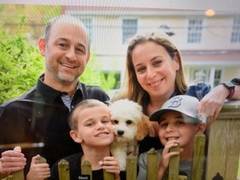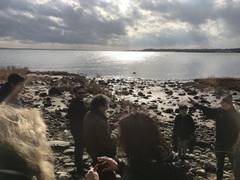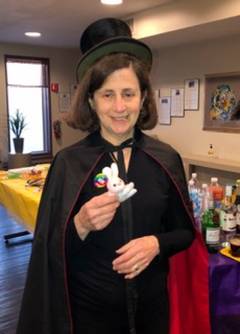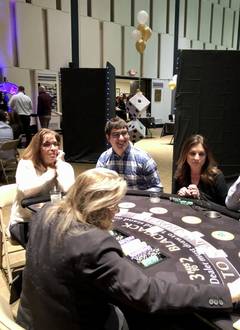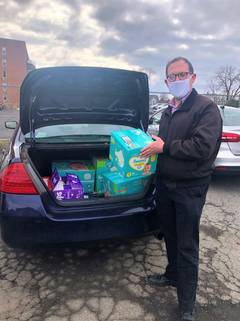Loneliness and Belonging (Rosh Hashanah Day 1 2023)
09/18/2023 09:37:54 AM
Rabbi Ben Goldberg
| Author | |
| Date Added | |
| Automatically create summary | |
| Summary |
Today, on Rosh Hashanah, you all see me standing here on the bimah. But that actually gives a misleading impression of what most of my days are like. On a typical day, I might go read a book to the children in our Early Childhood Program. They mostly pay attention, but it’s a long day, and they are only 3 or 4 years old, and sometimes they have trouble listening. Then, I might go teach our seventh graders in Religious School. They mostly pay attention, but it’s a long day, and they are only 12 or 13 years old, and sometimes they have trouble listening. Finally, I’ll participate in a meeting or class with the adults in the community. They mostly pay attention, but it’s a long day, and they are only 50 or 60 years old, and sometimes they have trouble listening.
I love that a synagogue engages people across the lifespan. Obviously, people in different stages of life need different things from me and from the synagogue. Yet, in a lot of ways, the 2 year old and the 92 year old actually need the same things.
A convergence of experiences I had earlier this year underscored this for me. In the same week, I had occasion to speak with a woman in her 90s, a middle-aged parent, and a middle schooler. While the particulars varied, these three people reported a common experience: feeling alone, even alienated, from others. Feeling a lack of a connection, feeling like there was no one who understood them, struggling to feel seen and heard. Sometimes, the barriers to connection were clear. More often, though, the cause was less obvious. Yet the result was the same: people feeling overwhelmed by the vulnerability required to turn acquaintances into friends, or that no one shares their interests and values, or that they hadn’t found a place or a group of people where they felt like they really belonged.
As the Beatles memorably sang decades ago: “All the lonely people, where do they all come from?” Already in the 1960s, those modern-day prophets could tell a story about the social breakdown and alienation that were already plaguing modern society: a friendless woman staring longingly out the window, a clergyman preparing a sermon that no one would hear, and then officiating at a funeral that no one attended. And the trend has only become more pronounced since then.
All the lonely people, where do they all come from? Let me clarify my terms. I’m not talking about solitude, the choice to spend time alone engaged in what is often a rejuvenating activity, whether it is meditation or fishing or any other solitary hobby. Nor am I talking only about the objective state of being unaccompanied, though that can contribute to loneliness.
Rather, loneliness is a state of mind, a distressing experience when one’s desired or expected social connections don’t match reality. We can also distinguish between two kinds of loneliness: temporal or situational loneliness, which has a clear cause, like a move, a divorce, the death of a spouse, or the limitations of aging; and chronic loneliness, which is a long-term condition not brought on by any particular change in one’s life.
Loneliness would appear to be an eternal by-product of our human condition as social creatures, wired from creation for connection with others. Indeed, social connection is as essential for human survival as shelter or food. Think about the Torah’s account of the creation of the world, which we remember today on Rosh Hashanah. In six neat days, God forms each major aspect of creation, and sees that each one is good. But then, there is something that God declares is not good: when human beings are alone. So God creates a fitting companion for the first person, a pair. What makes human beings different from the rest of creation is our need for companionship, for intimacy of all kinds with others–to know and to be known.
Yet even with a companion, we can still feel lonely. Consider this morning’s haftarah, the story of a lonely woman named Hannah. Hannah is surrounded by people: her husband Elkanah, his other wife Penina, Penina and Elkana’s children, and the throngs of people making pilgrimage alongside them to the Tabernacle in Shiloh. And yet, Hannah is profoundly alone in her unfulfilled desire for her own child. Taunted by Penina for her childlessness, Hannah could not join the festivities, weeping instead. Elkana attempts to comfort her, asking: “Hannah, why is your heart so sad? Am I not better to you than ten sons?”
I must confess that every year when I hear this haftarah, I experience an urge to reach back through the millenia, grab Elkana by the shoulders, and shout at him: You clueless man! You are not, in fact, better than ten sons! This woman is your wife, yet you have no idea what is going on for her. How devastating this comment must have felt for Hannah.
In desperation, Hannah prays for a child. But even the ancient priests mistake her for a drunken woman mocking their sacred space. They cannot see her for who she actually is: a woman in existential pain and distress reaching out to connect with God, albeit in an unconventional way.
Perhaps you have felt lonely like Hannah, surrounded by people–family, community members, religious leaders–who don’t understand you, connect with you, feel your pain and cry your tears. I’ve certainly felt that way.
All the lonely people, where do they all come from? Hannah’s story demonstrates that loneliness is nothing new. Yet, it would seem that loneliness is on the increase in our society. To take just one indication: a 2021 survey found that 12% of Americans said they had no friends. That may not sound like much, but that is a fourfold increase since the 1990s, when the figure was under 3%. Similarly, time studies have found that Americans spend 70% less time in person with friends, compared to two decades ago. And, as I mentioned last year, there has been a similar decline in affiliation in religious communities. As recently as 1999, 70% of Americans reported belonging to a religious community, whereas the figure now is less than 50%.
Indeed, in the past year, the surgeon general raised the alarm about the rising levels of loneliness in our society. Concerningly, about half of American adults report experiencing loneliness, with higher rates reported among younger adults.
Loneliness is not merely an individual problem, but a condition with profound impacts on public health, both mental and physical. The headline finding of the surgeon general’s report is that the “mortality impact of being socially disconnected is similar to that caused by smoking up to 15 cigarettes a day, and even greater than that associated with obesity and physical inactivity.” Our ancient sages expressed this profound link between social connection and physical health with the rhyme: o havruta, o mituta, either companionship or death.
So, why is loneliness on the rise? There is no one answer, but it appears to be connected with other social trends that have characterized our society in recent years, both as a cause and as an effect: political polarization, economic inequality, the rise of the internet and so-called “social” media, and the decline of voluntary associations of all kinds, including religious communities.
What is more, loneliness does not fall equally on everyone. Those who are or feel different from the perceived “norm” of those around them, whether because of their family structure or life experience or family background or other aspect of their identity, are more likely to experience loneliness. As Jews, many of us have probably encountered something like this, where an offhand remark about Jews or Israel led us to feel uncomfortable or alienated in a certain space.
Something that can make loneliness worse is the stigma surrounding it. At times it can seem like everyone else has their act together, and it’s just me sitting at home feeling this way. But as the story of Hannah, and the social science research makes clear, loneliness is a very widespread, even universally human experience. You are not alone in your loneliness.
I remember times in my life, especially before I met Daniel, where I struggled to connect with others. Even in college, surrounded by peers, I spent a lot of Saturday nights by myself. I sought out those social connections, but wasn’t always sure how to go about it. Perhaps you’ve had similar experiences at points in your life.
Mitigating the increase in loneliness will require many interventions across every level of society, from how our physical spaces are built to how medical care is provided. But, I’m a rabbi, so this morning, I want to focus on our community, and how we can help each other feel a little less lonely this year.
It is our privilege this year at KTI to participate in the Belonging Project through CLAL, the National Jewish Center for Learning and Leadership, along with a cohort of Westchester and Long Island synagogues. This cutting-edge initiative merges scientific research, relational best practices, and ancient Jewish wisdom to help transform synagogues into places where people feel a deep sense of belonging.
So how do we do that? The Belonging Project, in partnership with a leading research organization, has developed a four-stage model that breaks down belonging into concrete steps that bring someone from newcomer or outsider to feeling like an accepted and valued member of the group.
The first step is Noticed–when people see that their presence and participation is noted by others. This looks like being greeted at services and events and understanding that one’s presence and participation matters to other participants and to the community overall.
The second step is Named. This includes other people literally knowing a person’s name and a few pertinent facts about them. At this stage, a person is no longer a stranger, but has yet to fully belong.
The third step is Known, when someone feels that they can be their fullest, authentic version of themselves. They feel comfortable enough to share aspects of their lives that they may not share everywhere, including perspectives and experiences that may be hard for others in the community to hear.
The final step is Needed, when someone feels such a sense of belonging that they are inspired to give of their talents, skills, and resources. They contribute to the sustenance of the community and help welcome others. Indeed, Clal’s initial research found that congregants with a high sense of belonging were 12 times more likely to donate money to their synagogue, compared with those with no sense of belonging.
In order for us to know where we stand, we need to establish our baseline level of belonging within the community. This is where you all come in. On Monday, you’ll receive a link to take KTI’s belonging project survey. Please take this survey and let us know about your experience at KTI. I suspect many of you feel that you deeply belong here, and others, less so. We want to hear all about it. On the basis of this information, and with expert help from CLAL, we’ll create new programs and initiatives to help deepen the sense of belonging across KTI.
One of the building blocks of belonging in a community are the individual relationships between people within the community. After five years here, I’d like to think that I’ve established such relationships with many of you. But I know that these relationships can also be broader and deeper, and will continue to reach out in this new year.
But, on your end, I have another request for you: bother me. Really. Please bother me. I can’t tell you how often I will call someone to wish them a happy birthday, or see someone at an event or around town, only to hear: “You know, rabbi, I didn’t want to bother you, but…” And then, we have a really holy conversation about something of great importance in one of your lives.
And so, my request to you is this: please bother me. Don’t hesitate. If something is on your mind, please give me a call. Or email. Or stop by my office. Really. Your “interruptions” are my work. I promise that you aren’t bothering me, and I strive to return your communications in a timely manner. Similarly, if you or a loved one is hospitalized, please let me know–for privacy reasons, hospitals do not automatically share such information. It would be my honor to visit and support you during that difficult time.
I have to wonder, though, if I’m not the only person people don’t want to “bother.” Reaching out in a bid for companionship requires tremendous vulnerability. You don’t know how the other person will respond, if at all. There are times when I hesitate to reach out to friends and acquaintances of mine. I find myself thinking that they are too busy for me, or that it’s weird to reach out, seemingly at random, just to say hi. But of course, if everyone thinks that, we’ll never reach out. To get over this hurdle, I find it helpful to think of the times I’m on the receiving end of such outreach. I love hearing from old friends, and remind myself that most people do. It’s enough to give me the little push I need to muster up the courage to send that text or make that call.
Earlier, I mentioned the story of Hannah that is this morning’s haftarah. As that story continues, the priest realizes that he completely misjudged Hannah, and blesses her, that her desire for a child be fulfilled. And sure enough, God remembers Hannah and she gives birth at last.
As this new year begins, we pray that God will remember us likewise, attending to our deepest concerns and keeping us front of mind, just as God remembered Noah and Sarah and the many other ancestors we mention in the liturgy today.
Yet, as fervently as we pray today, I cannot guarantee you that it will have any impact on God. But what I do know is this: if we remember each other, if we see each other in our loneliness and try to alleviate it, if we each help create communities where belonging and ever-deeper relationships are at the center, then we may find our lives richer, our spirits higher, and our years sweeter. Shana tova.
Sun, November 2 2025
11 Cheshvan 5786
Photo Gallery
Photo Albums
Upcoming Events
-
Wednesday ,
NovNovember 5 , 2025Rabbi, May I? Modern Responsa
Wednesday, Nov 5th 10:00a to 11:30a
Wednesdays, 10 - 11:30 AM, KTI Library Ever since Abraham’s famous argument with God, Judaism has been full of debate. Moses and Korah, David and Nathan, Hillel and Shammai, the Vilna Gaon and the Ba’al Shem Tov, Spinoza and the Amsterdam Rabbis . . . the list goes on. No wonder that Judaism cherishes the expression machloket l’shem shamayim, “an argument for the sake of heaven.” Beyond their historical importance, what makes these disputations so compelling is that nearly all of them, regardless of their epochs, are still being argued. The parade of characters spanning three millennia of biblical, rabbinic, and modern disputation reflects the panorama of Jewish history with its monumental political, ethical, and spiritual challenges. This series will examine Jewish responses to exile from the biblical period to our modern day. Considering texts from all genres of Jewish literary creativity, we will explore how the realities and iterpretaions Join as we re-open these timeless debates that lead us to the core of 3,000 years of Jewish conversation. • Justice: Abraham vs. God (October 19) • Holiness and Authority: Moses vs. Korah (November 9) • Inclusion: The Five Daughters vs. the Twelve Tribes (November 30) • Accountability and Morality: David vs. Nathan (December 21) • Resistance: Ben Zakkai vs. the Zealots (January 18) • Law: Hillel vs. Shammai (February 15) • Spirituality: The Vilna Gaon vs. the Baal Shem Tov (March 15) • Boundaries: Spinoza vs. the Amsterdam Rabbis (April 19) • Religious Evolution: Geiger vs. Hirsch vs. Frankel (May 10) • Zionism: Herzl vs. Wise (May 31) -
Thursday ,
NovNovember 6 , 2025Coffee with the Rabbi
Thursday, Nov 6th 8:00a to 9:00a
Start your morning with some caffeine and casual or meaningful conversation! Join Rabbi Goldberg for a Coffee Chat! Stop by Rye Ridge Starbucks any of the following Thursdays, between 8-9am: June 12 and 26 July 10 and 24 August 7 and 21 September 4 and 18 October 16 and 30 November 6 and 20 December 4 and 18 -
Thursday ,
NovNovember 6 , 2025Janet Heiser Game Night 2025
Thursday, Nov 6th 7:00p to 9:00p
Bring your friends for a night of Mah Jongg, Canasta, Bridge and prizes! Thursday, November 6th at 7:00pm KTI Social Hall $30 per person ($36 per person after Nov. 3) in memory of Janet Heiser, whose tireless effort helped to strengthen Jewish connections and continuity at KTI and the greater Jewish community Co-Chairs Pam Kaplow - pdougk@aol.com Laurie Landes - lrl52@aol.com -
Friday ,
NovNovember 14 , 2025Give Thanks at Tot Shabbat 2025
Friday, Nov 14th 5:30p to 6:30p
-
Tuesday ,
NovNovember 18 , 2025Women's Rosh Chodesh Group
Tuesday, Nov 18th 12:00p to 1:30p
New Women's Rosh Chodesh Group Tuesdays, 12:00-1:30pm Gather with Cantor Sklar and KTI friends at the start of each month of the Hebrew calendar to learn about the themes and traditions of the coming month. Learn from each other, learn more about each other and better understand the women within our tradition. Enjoy music and lunch together! Please a dairy or parve lunch to enjoy at noon, followed by the discussion at 12:30pm. KTI will provide drinks and dessert. RSVP Appreciated
Privacy Settings | Privacy Policy | Member Terms
©2025 All rights reserved. Find out more about ShulCloud

